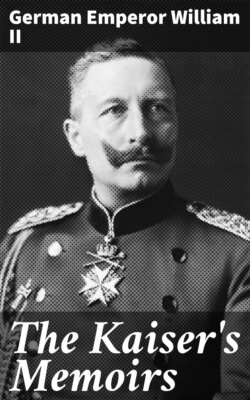Читать книгу The Kaiser's Memoirs - German Emperor William II - Страница 18
На сайте Литреса книга снята с продажи.
THE BREAK WITH BISMARCK
ОглавлениеTable of Contents
When I was Prince William I was placed for a long time under the Chief President of the Province of Brandenburg, von Achenbach, in order that I might learn about home administration, get experience in economic questions, and, moreover, take an active part in the work. Spurred on by the captivating discourses of Achenbach, I derived from this period of my life a special interest in the economic side of the inner development of the country, whereas the purely judicial side of the administration interested me to a lesser degree. Improvements, canal construction, highway building, forestry, improvement in all kinds of transportation facilities, betterment of dwellings, introduction of machines into agriculture and their co-operative development—all of these were matters with which I busied myself later on; this being especially true of hydraulic work and the development of the network of railways, particularly in the badly neglected territory of Eastern Germany.
I discussed all these matters with the Ministers of State after I had ascended the throne. In order to spur them on, I allowed them free rein in their various domains. But it turned out that this was hardly possible so long as Prince Bismarck remained in office, since he reserved for himself the main deciding voice in everything, thereby impairing the independence of those working with him. I soon saw that the Ministers, being entirely under Bismarck's thumb, could not come out in favor of "innovations" or ideas of the "young master" of which Bismarck disapproved.
The Ministry, in short, was nothing but a tool in the hands of Bismarck, acting solely in accordance with his wishes. This state of things was, in itself, natural enough, since a Premier of such overwhelming importance, who had won for Prussia and Germany such great political victories, naturally dominated his Ministers completely and led them despotically. Nevertheless, I found myself in a difficult position; the typical answer with which my suggestions were met was: "Prince Bismarck does not want that done; we cannot get him to consent to that; Emperor William I would not have asked such a thing; that is not in accordance with tradition, etc." I understood more and more that, in reality, I had no Ministry of State at my disposal; that the gentlemen composing it, from long force of habit, considered themselves officials of Prince Bismarck.
Here is an example to show the attitude of the Cabinet toward me in those Bismarck days: The question came up of renewing the Socialist law, a political measure devised by Prince Bismarck for fighting socialism. A certain paragraph therein was to be toned down, in order to save the law. Bismarck opposed the change. There were sharp differences of opinion. I summoned a Crown Council. Bismarck spoke in the antechamber with my adjutant; he declared that His Majesty completely forgot that he was an officer and wore a sword belt; that he must fall back upon the army and lead it against the Socialists, in case the Socialists should resort to revolutionary measures; that the Emperor should leave him a free hand, which would restore quiet once for all. At the Crown Council Bismarck stuck to his opinion. The individual Ministers, when asked to express their views, were lukewarm. A vote was taken—the entire Ministry voted against me.
This vote showed me once more the absolute domination exerted by the Chancellor over his Ministers. Deeply dissatisfied, I talked over the matter with His Excellency Lucanus, who was as much struck as I was by the situation. Lucanus looked up some of the gentlemen and took them to task for their attitude, whereupon they made it clear that they were "not in a position" to oppose the Prince and declared that it was quite impossible for anybody to expect them to vote against the wishes of the Prince.
